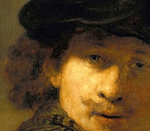
"Birth and Naming of John the Baptist"
The sole biblical account of the birth of John the Baptist comes from the Gospel of Luke. John's parents, Zechariah or Zachary—a Jewish priest—and Elizabeth, were without children and both were beyond the age of child-bearing. During Zechariah's rotation to serve in the Temple in Jerusalem, he was chosen by lot to offer incense at the Golden Altar in the Holy Place. The Archangel Gabriel appeared to him and announced that he and his wife would give birth to a child, and that they should name him John, a name which was unfamiliar in Zechariah and Elizabeth's families. Acts 4:6 refers to a "John" among the high priests who challenged the apostles' preaching after Pentecost, so the name was not unknown within the wider priestly family. However, because Zechariah did not believe the message of Gabriel, he was rendered speechless until the time of John's birth. At that time, his relatives wanted to name the child after his father, and Zechariah wrote, "His name is John", whereupon he recovered his ability to speak (Luke 1:5–25; 1:57–66). Following Zechariah's obedience to the command of God, he was given the gift of prophecy and foretold the future ministry of Jesus, this prophecy forming the text of the Benedictus canticle.
At the Annunciation, when the angel Gabriel appeared to the Virgin Mary to inform her that she would conceive of the Holy Ghost, he also informed her that Elizabeth, her cousin, was already six months pregnant (Luke 1:36). Mary then journeyed to visit Elizabeth. Luke's Gospel recounts that the baby "leapt" in Elizabeth's womb at the greeting of Mary (Luke 1:44).
The Nativity of John the Baptist on June 24 comes three months after the celebration on March 25 of the Annunciation, when the angel Gabriel told Mary that her cousin Elizabeth was in her sixth month of pregnancy, and six months before the Christmas celebration of the birth of Jesus. The purpose of these festivals is not to celebrate the exact dates of these events, but simply to commemorate them in an interlinking way. The Nativity of John the Baptist anticipates the feast of Christmas.
Barent or Bernard Pietersz Fabritius (or Fabricius) (16 November 1624 – 20 October 1673), was a Dutch painter of biblical subjects. His early works, dating from the 1650s, are based on Rembrandt’s style of the 1640s, with deepened use of colour and of light and shade. He was also influenced by the work of his more famous older brother Carel Fabritius.